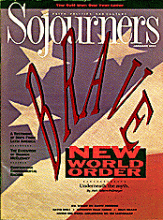Assistant editor Jim Rice and I have on several occasions debated whose high school athletic team name is most offensive. He played for the Richland Bombers--the name derived from the nuclear weapons plant that supplied most of the jobs for that Washington state community. I watched from the stands my high school team, the Mandan (North Dakota) Braves. Finally, the argument may have turned in my favor.
The recently completed World Series will be remembered for quite a while. It was a great series, filled with wonderful memories for anyone who loves the summer game.
But it will also be remembered for the demonstrations staged by the American Indian community around the images and actions of the fans from Atlanta, the home of the Braves. The Atlanta devotees had over the course of the season taken to chopping the air with imaginary--and later foam and rubber--tomahawks, wearing war paint, and singing a dreadful rendition of an Indian war chant. American Indians are suggesting that Atlanta be the home of something else, because the team's name is offensive to and demeaning of people of Indian heritage.
These protests will provide the most lasting memories, I think, because the demonstrators will be successful in their efforts to change the names of professional sports teams that use Indian symbols, mascots, or chants. After all, the protesters are right.
Some institutions--mostly colleges--have already recognized the offensive nature of such caricatures and changed their mascots accordingly. The Syracuse Redmen, for example, became the Orangemen (the sexist language is a problem yet to be rectified); the Stanford Indians became the Cardinal. In Minnesota, the state board of education has advised individual school districts to change offensive team names, recognizing that the caricature can become an object of scorn at opponents' pep rallies.
Read the Full Article

